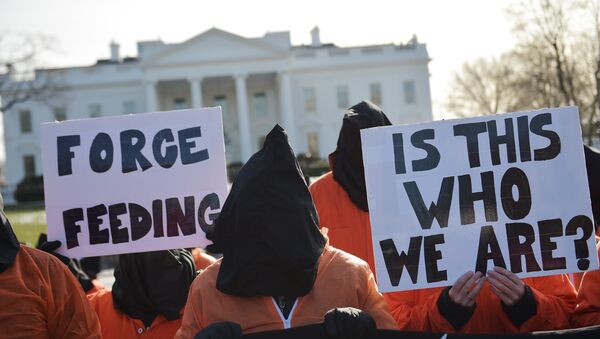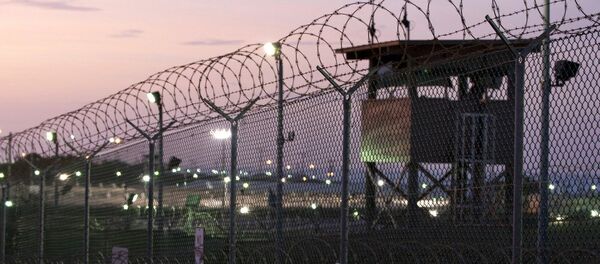"We're here to remind the President Barack Obama and the people of the United States and all over the world that this is a crime… we need to continue to demand the closure of Guantanamo," Organizer and member of Witness Against Torture Christopher Knestrick told Sputnik.
Sunday marked the 13th anniversary of the now 127 prisoners remaining at the Cuban facility.
Knestrick told Sputnik that the demonstrators would also march to the Washington, DC central cell block to make the connection between the Guantanamo detention injustice to the "mass incarceration here [in the United States and] racism here in the United States… similar and related to Islamophobia and the men in Guantanamo."
The demonstration began with speakers from faith organizations, poets, human rights organizations and activists, addressing the crowd telling them stories of the Guantanamo prisoners who they work with and why the prison should be closed.
"We're not going away," activist of several human rights organizations Joan Stallard told Sputnik.
He vowed to continue rallies until all Guantanamo inmates were all released, "if it means that they get moved into maximum security prisons… Guantanamo needs to be closed we need to have our justice system out where we can see it."
"We want to let the detainees know in Guantanamo that not all the United States citizens demonize them and that there are United States citizens that do support them," Streit told Sputnik.
Since November, the United States has released 28 Guantanamo detainees to countries including Afghanistan, Uruguay, Saudi Arabia, Slovakia and Kazakhstan, leaving 127 prisoners left at the detention facility, according to the Pentagon. Some have even remained at the prison for years despite having been cleared for release.
In 2009, President Obama signed an executive order to close Guantanamo Bay and described the detention facility as a "sad chapter in American history." However, the Cuban prison site remains open today.
The detention facility, located in Cuba, has been the subject of harsh criticism by human rights groups, governments and media since its establishment in 2002. Health workers, inspectors and former detainees have described the conditions at the camp as cruel and inhumane, and have reported numerous acts of torture.




